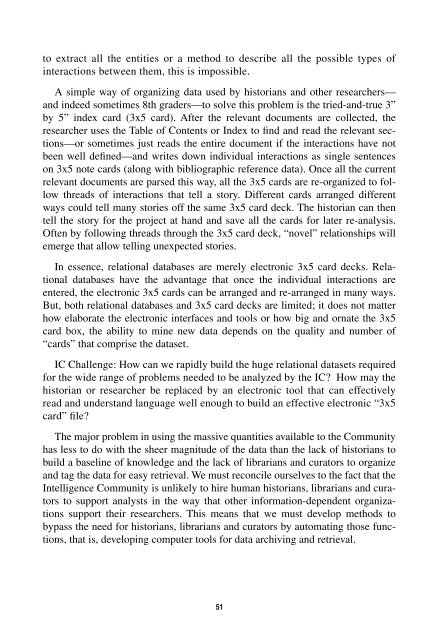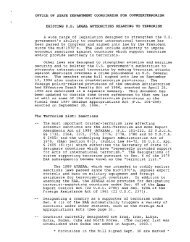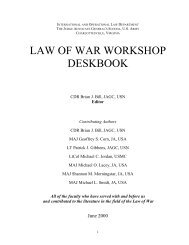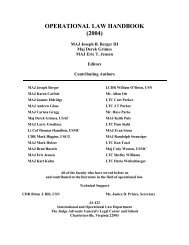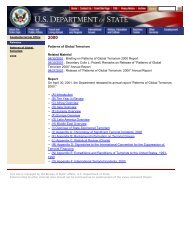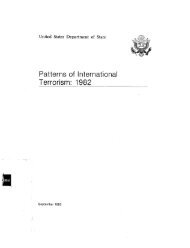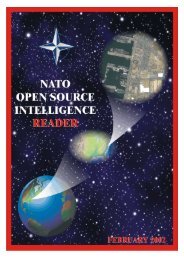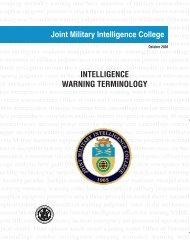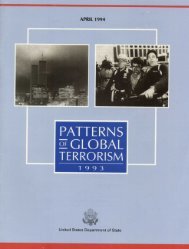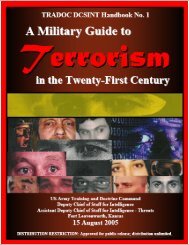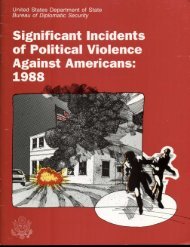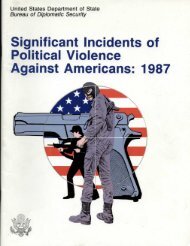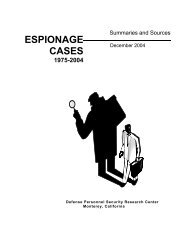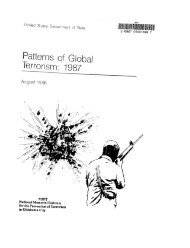Warning Analysis for the Information Age - Higgins Counterterrorism ...
Warning Analysis for the Information Age - Higgins Counterterrorism ...
Warning Analysis for the Information Age - Higgins Counterterrorism ...
Create successful ePaper yourself
Turn your PDF publications into a flip-book with our unique Google optimized e-Paper software.
to extract all <strong>the</strong> entities or a method to describe all <strong>the</strong> possible types ofinteractions between <strong>the</strong>m, this is impossible.A simple way of organizing data used by historians and o<strong>the</strong>r researchers—and indeed sometimes 8th graders—to solve this problem is <strong>the</strong> tried-and-true 3”by 5” index card (3x5 card). After <strong>the</strong> relevant documents are collected, <strong>the</strong>researcher uses <strong>the</strong> Table of Contents or Index to find and read <strong>the</strong> relevant sections—orsometimes just reads <strong>the</strong> entire document if <strong>the</strong> interactions have notbeen well defined—and writes down individual interactions as single sentenceson 3x5 note cards (along with bibliographic reference data). Once all <strong>the</strong> currentrelevant documents are parsed this way, all <strong>the</strong> 3x5 cards are re-organized to followthreads of interactions that tell a story. Different cards arranged differentways could tell many stories off <strong>the</strong> same 3x5 card deck. The historian can <strong>the</strong>ntell <strong>the</strong> story <strong>for</strong> <strong>the</strong> project at hand and save all <strong>the</strong> cards <strong>for</strong> later re-analysis.Often by following threads through <strong>the</strong> 3x5 card deck, “novel” relationships willemerge that allow telling unexpected stories.In essence, relational databases are merely electronic 3x5 card decks. Relationaldatabases have <strong>the</strong> advantage that once <strong>the</strong> individual interactions areentered, <strong>the</strong> electronic 3x5 cards can be arranged and re-arranged in many ways.But, both relational databases and 3x5 card decks are limited; it does not matterhow elaborate <strong>the</strong> electronic interfaces and tools or how big and ornate <strong>the</strong> 3x5card box, <strong>the</strong> ability to mine new data depends on <strong>the</strong> quality and number of“cards” that comprise <strong>the</strong> dataset.IC Challenge: How can we rapidly build <strong>the</strong> huge relational datasets required<strong>for</strong> <strong>the</strong> wide range of problems needed to be analyzed by <strong>the</strong> IC? How may <strong>the</strong>historian or researcher be replaced by an electronic tool that can effectivelyread and understand language well enough to build an effective electronic “3x5card” file?The major problem in using <strong>the</strong> massive quantities available to <strong>the</strong> Communityhas less to do with <strong>the</strong> sheer magnitude of <strong>the</strong> data than <strong>the</strong> lack of historians tobuild a baseline of knowledge and <strong>the</strong> lack of librarians and curators to organizeand tag <strong>the</strong> data <strong>for</strong> easy retrieval. We must reconcile ourselves to <strong>the</strong> fact that <strong>the</strong>Intelligence Community is unlikely to hire human historians, librarians and curatorsto support analysts in <strong>the</strong> way that o<strong>the</strong>r in<strong>for</strong>mation-dependent organizationssupport <strong>the</strong>ir researchers. This means that we must develop methods tobypass <strong>the</strong> need <strong>for</strong> historians, librarians and curators by automating those functions,that is, developing computer tools <strong>for</strong> data archiving and retrieval.51


